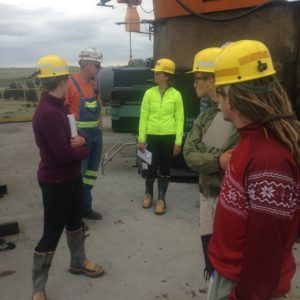With all the talk and debate about energy in politics and media, sometimes we forget what we’re actually talking about. Theories and statistics about energy production, climate change, economics, jobs, resources, and pollution are thrown around so much that it is sometimes difficult to make sense of it all. For many of us, these are distant issues. We simply flip a switch and expect the light to come on. Rarely do we give it much thought, particularly if we don’t personally know anyone that is more directly impacted by these issues. It is for this reason that I’d like to take a few minutes to talk about some of the people we’ve met and what they stand to lose in the energy debate.
economics, jobs, resources, and pollution are thrown around so much that it is sometimes difficult to make sense of it all. For many of us, these are distant issues. We simply flip a switch and expect the light to come on. Rarely do we give it much thought, particularly if we don’t personally know anyone that is more directly impacted by these issues. It is for this reason that I’d like to take a few minutes to talk about some of the people we’ve met and what they stand to lose in the energy debate.
A little ways north of Billings, we met a rancher named Steve. He seems to be a dying breed — a real cowboy in every sense of the word. He runs his ranch the old fashioned way, from his saddle. He grazes his cattle above some of the operations of the Signal Peak coal mine, which is cause for concern. Steve worries about the safety of the aquifers that he and other ranchers near the Bull Mountains depend on. Subsidence could permanently alter water flow, which would leave many ranchers without a sufficient water source. Steve has a well on his property a ways from the mine, but it can’t provide near enough water for his cattle. That’s not the only thing on his mind, however. He is fighting a complicated battle against desertification on his land as well.
It seems like Steve is pursuing a Ph D in everything — he is exploring soil restoration and carbon sequestration, and is constantly analyzing and modifying his grazing methods to maximize the potential of his land. He is planning on cutting his herd by half. This is in part due to desertification, but also because his son, who helps out on the ranch, is leaving to pursue a different career. Ranchers like Steve must face these challenges in a world in which large-scale corporate and investor-owned ranches are already edging out smaller-scale independent and family-owned ranches.
When we toured the Signal Peak coal mine, we met three gentlemen — Gregg, Byron, and Ray. They are all hardworking men that are part of an impressive mining operation. We may not like the idea of coal, but we depend on these men regardless. It is easy to talk about ending coal production from an environmental perspective, but these are the men who would lose their jobs as a result. They have wives and children, and fill an important role in society. They are good at what they do and are proud of the mine’s advancements in safety and preventing water pollution. All three of these men were very welcome and open with us — after all, said Byron, “We have nothing to hide.” Gregg even stopped by our campsite in Roundup that night to make sure we had everything we needed. He stayed for a while to answer even more of our questions. He also offered to let us stay in his garage if it rained. It isn’t uncommon for people to vilify the coal industry, but is that fair? We need men like these to do their work because of our own habits as consumers. We cannot blame workers in the coal industry for our problems.
We met Lee while visiting the Judith Gap wind farm. The tour wasn’t ‘prepared’ and glossy, but Lee was willing to take as much time as we wanted, answering all our questions and showing us around the facility. Lee works full-time maintaining the farm’s 90 turbines. He’d never gotten a college degree; most of his knowledge comes from experience and on-the-job training. He said it was difficult to get a job on the site, because the company was looking for workers who had experience with wind energy. At that time (about ten years ago), however, very few people in Montana had any experience with wind. He says he enjoys his work because he feels like he’s making a positive difference in the world by providing pollution-free electricity to society.
It isn’t easy, but I urge everyone to think about the people whose jobs, livelihoods, and families we are discussing rather than just the statistics. Everyone I have mentioned, and thousands of others, could find themselves facing serious challenges depending on our choices as a society. There is likely no magical solution that can make everyone happy. To simply end coal production would leave Gregg, Byron, Ray, and hundreds or thousands more coal workers without jobs. Yet mining expansions can threaten the ranchers near the mines, such as Steve.
Technologies and relationships in energy production are evolving very quickly — it is essential that we come up with effective and efficient ways to adapt to our changing world. There was a time when typewriters were the best available technology, but they still became obsolete with the proliferation of the computer. Energy production is the same way. That said, it is still a very sensitive issue on many levels — economically, culturally, socially, politically, and environmentally. We must remain conscious of this as we try to come up with lasting solutions for the future.